Trump Attracts Most Canadians’ Attention; Jobs, Climate Change & Khadr Hot Button Issues
July 21, 2017
Donald Trump is attracting huge interest on the part of Canadians, and not because people are impressed with the President. This month, the number of people who say he is America’s “worst president ever” stands at 49%, up 7 points in one month.
Polling Canadians about the topics they are paying attention to, finds Trump’s presidency topping the list, followed by jobs & the economy, climate change, the Khadr decision and housing affordability. Fewer people were following the NAFTA renegotiation and the G20 which just wrapped up in Hamburg.
Asked how they felt the federal government was handling each of these issues, most think the Trudeau government is doing a good or acceptable job with respect to the G20, climate change, jobs and the economy, NAFTA renegotiation and in how they are relating to President Trump. Opinion is split when it comes to housing affordability, with 44% saying the government is doing a good or acceptable job, and 46% saying poor.
On the matter of Mr. Khadr, 33% give the federal government a good/acceptable rating, compared to 55% who said poor.
An additional question on Khadr was asked in our survey that offered three possible responses: “the government made a difficult but perhaps the best choice available”, “the government should have made a different choice” or “I don’t really know enough of the details to have an opinion”. In answering this question, 43% said the government should have made a different choice, including 74% among Conservative voters.
Liberal and NDP voters tended towards the view that the government made a difficult but perhaps the best available choice with 28% nationally favouring this point of view. Almost one in three (29%) felt they didn’t know enough of the details to have an opinion.

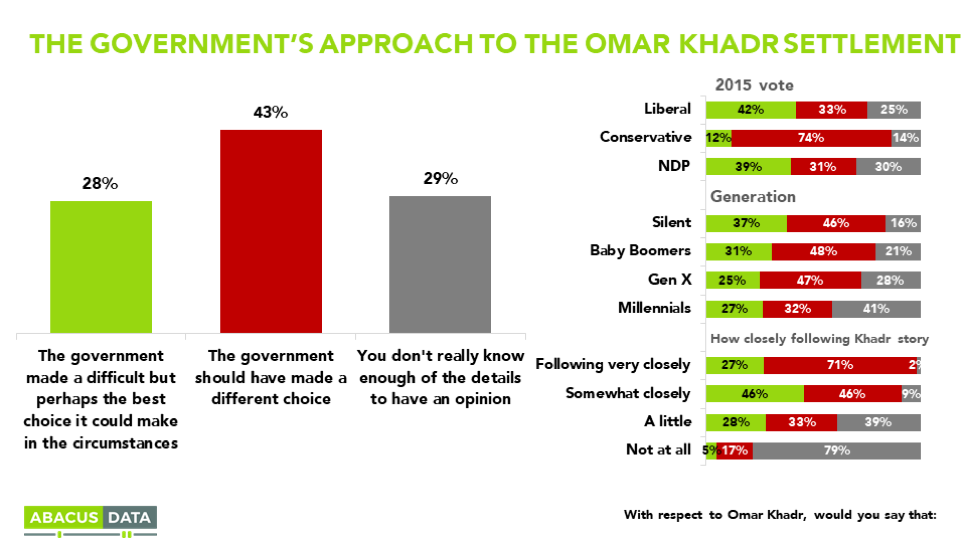
A deeper analysis of who is paying attention to what reveals:
• The Khadr settlement attracted a lot of attention in most parts of the country, except Quebec. Attentiveness skews heavily towards older, and Conservative voters.
• The Trump presidency attracts lots of attention across the country, and above average attention among Baby Boomers.
• The climate change issue attracts lots of attention across the country, and across different age groups. Conservative voters are a bit less attentive to it than others, but 49% still say they are following it very closely or somewhat closely.
• The G20 meeting and NAFTA are lightly followed overall, with older people more likely to pay attention than younger people.
• Jobs is an issue where interest is also fairly consistent across the country and across generations and party lines.
• Interest in housing affordability spikes in British Columbia and Ontario, the two markets where markets have experienced the most upward price pressures in recent years. Seniors are paying as much attention as Millennials on this issue.
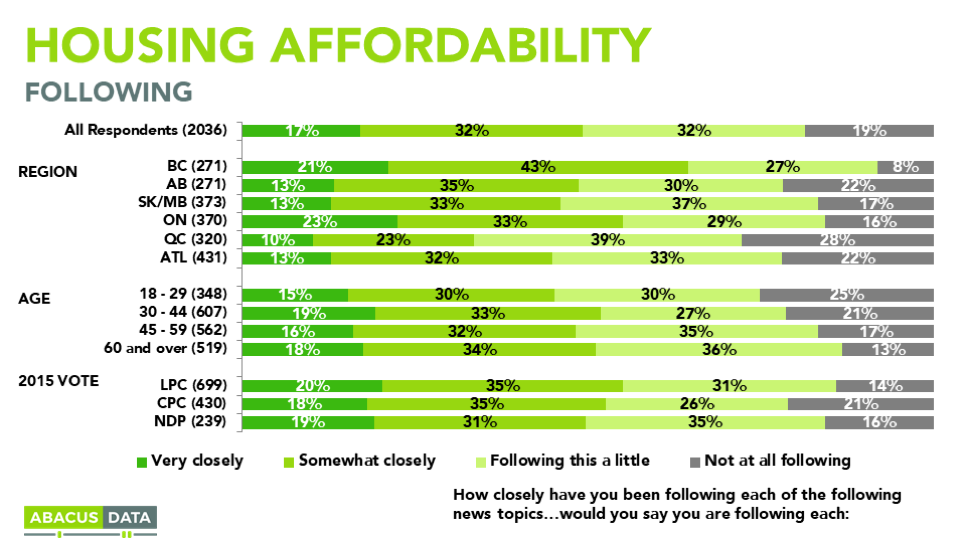
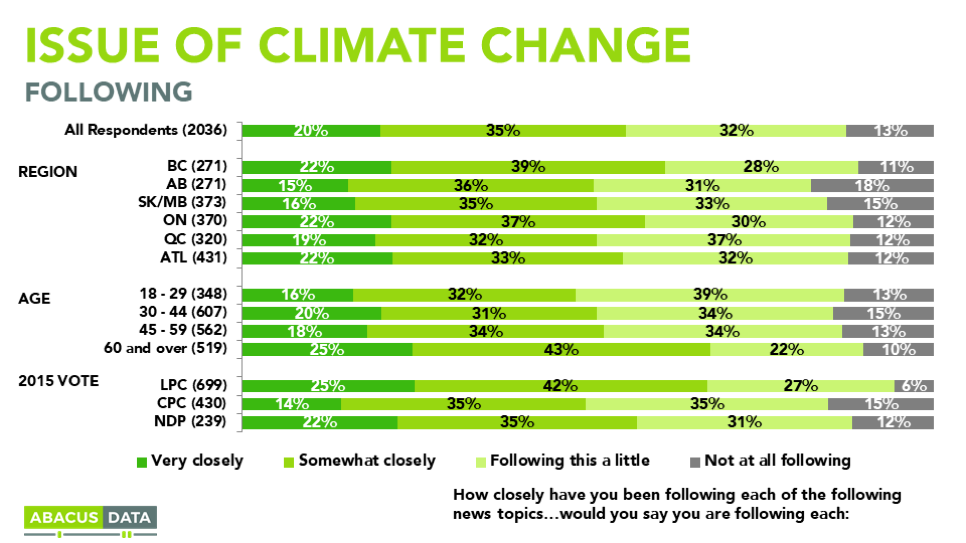
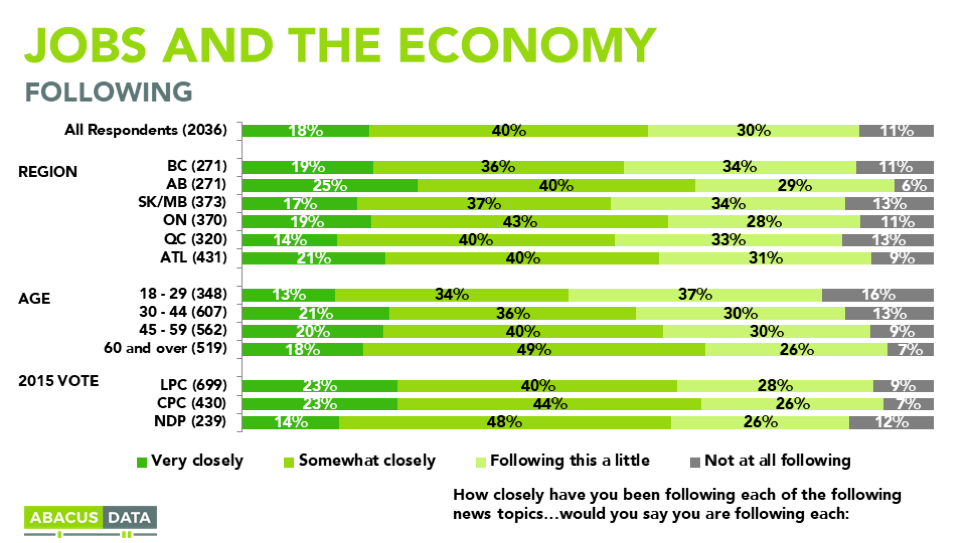
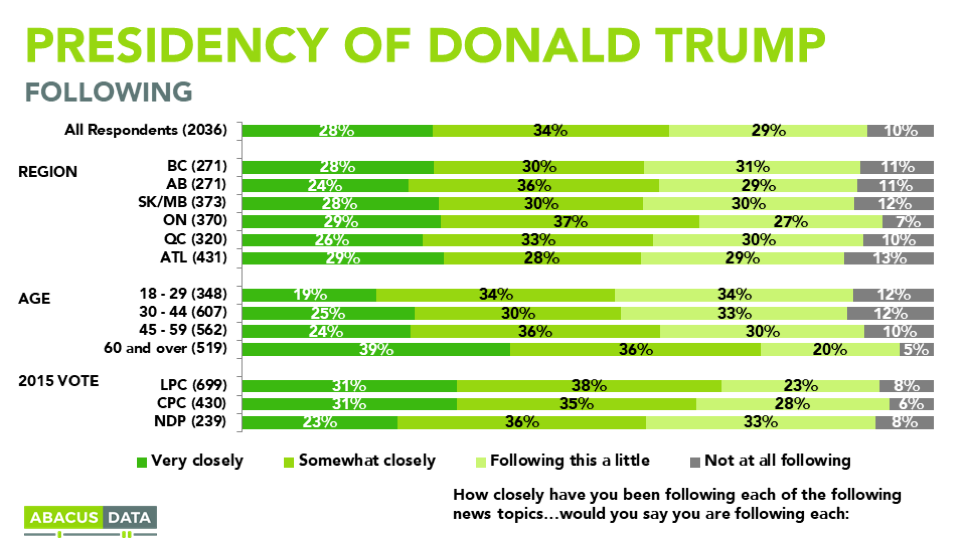
In terms of the ratings of the federal government, here are some key findings (among those who say they are paying some attention to each issue):
• On jobs and the economy, majorities in every region, all age groups give the government good or acceptable ratings. Even 49% of Conservative voters give the government a passing or better grade, as do 67% of NDP voters.
• On Khadr, Conservative voters are clearly unhappy, as are a majority of voters in every region but Quebec. Older voters are considerably more unhappy about this choice than younger voters.
• On climate change majorities in every region, including Alberta (72%) say the government is doing an acceptable or good job, as do a majority of Conservative voters (54%).
• Majorities across all regions, age groups and parties say the government is doing a good or acceptable job in dealing with Donald Trump’s presidency and the NAFTA renegotiation.
• On housing affordability, the most disappointed voters are NDP voters and BC residents.
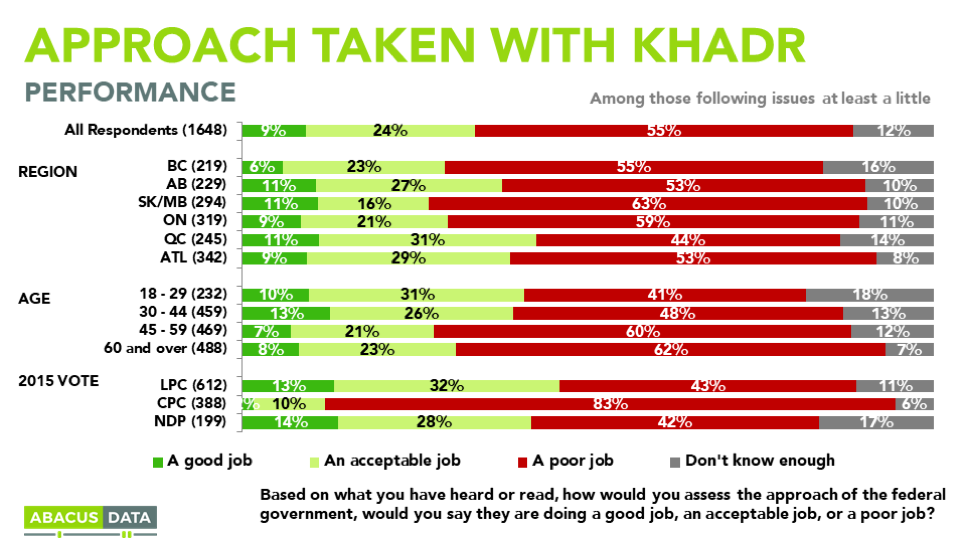
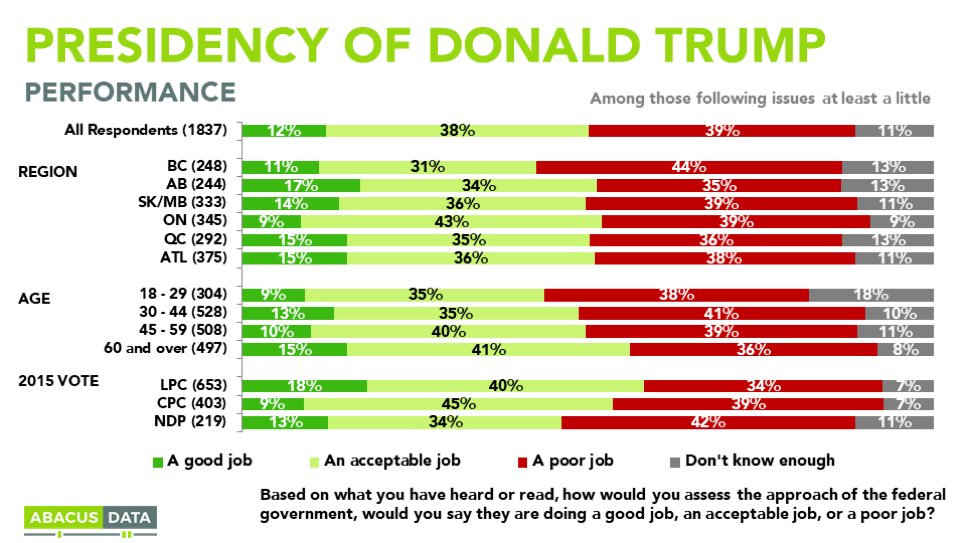
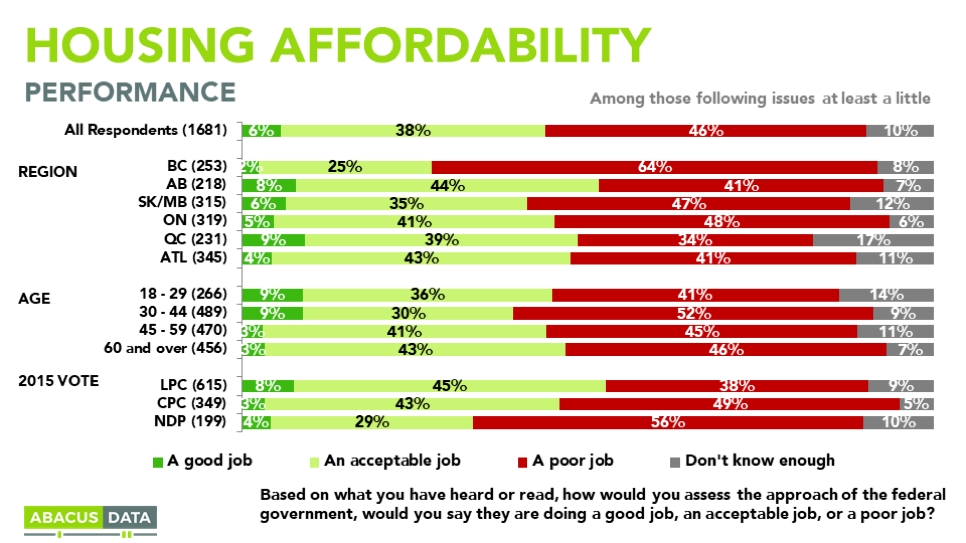
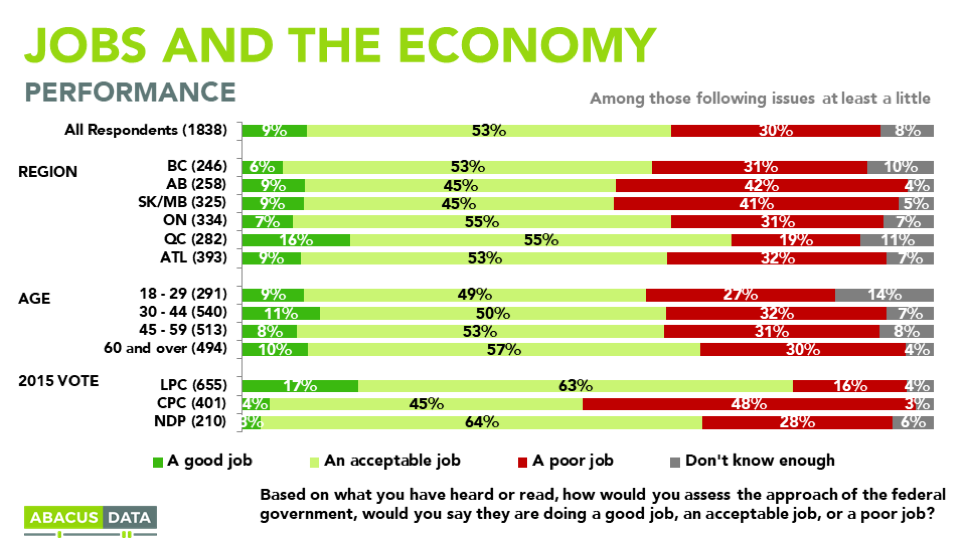
UPSHOT
According to Bruce Anderson: “Canadians have a strong interest in Donald Trump, and opinions of the US President are growing worse. Against that backdrop, people tend to see the Canadian situation in a fairly positive light overall. Most people feel they have a government that is handling the economy fairly well, shows appropriate concern for climate change and is managing a tricky relationship with an unpredictable administration in Washington DC. There is no doubt that a pretty substantial number of people were uncomfortable with the Khadr settlement, but for many voters it is but one of a number of factors they use to evaluate the government – this one decision is not, for the moment anyway, playing a decisive role in their overall satisfaction with the Trudeau government.
One other thing stands out in these results – the fact that climate change is now a topic of broad mainstream interest across the country now. We may have entered something of a new normal in terms of the level of interest in this issue, and the policy choices that governments make around it.”
According to David Coletto: “This poll helps us understand the interplay of issues and individuals that are capturing the public’s attention at any given moment.
There’s no doubt that the settlement with Omar Khadr caught many Canadians’ attention and left a bad taste in many mouths. But these issues don’t operate in a vacuum, something Bruce and I have continually stressed in our analyses. Canadians are also paying close attention to what’s going on south of the border, with the economy and jobs, housing affordability and climate change.
Given that we found no change in public attitudes towards the government (approval and vote intention holding steady), it’s hard to conclude that the Khadr issue has materially hurt the Liberals at this point. In fact, a more likely explanation is that increasing confidence in the economy, general satisfaction with the government’s approach to climate change, and fairly good assessments of its handling of the Trump presidency might have offset any discomfort the Khadr decision might have had.”
METHODOLOGY
Our survey was conducted online with 2,036 Canadians aged 18 and over from July 14 to 18, 2017 2017. A random sample of panelists was invited to complete the survey from a large representative panel of over 500,000 Canadians.
The Marketing Research and Intelligence Association policy limits statements about margins of sampling error for most online surveys. The margin of error for a comparable probability-based random sample of 2,036 is +/- 2.2%, 19 times out of 20.
The data were weighted according to census data to ensure that the sample matched Canada’s population according to age, gender, educational attainment, and region. Totals may not add up to 100 due to rounding.
ABACUS DATA INC.
We offer global research capacity with a strong focus on customer service, attention to detail and value-added insight. Our team combines the experience of our Chairman Bruce Anderson, one of Canada’s leading research executives for two decades, with the energy, creativity and research expertise of CEO David Coletto, Ph.D.




